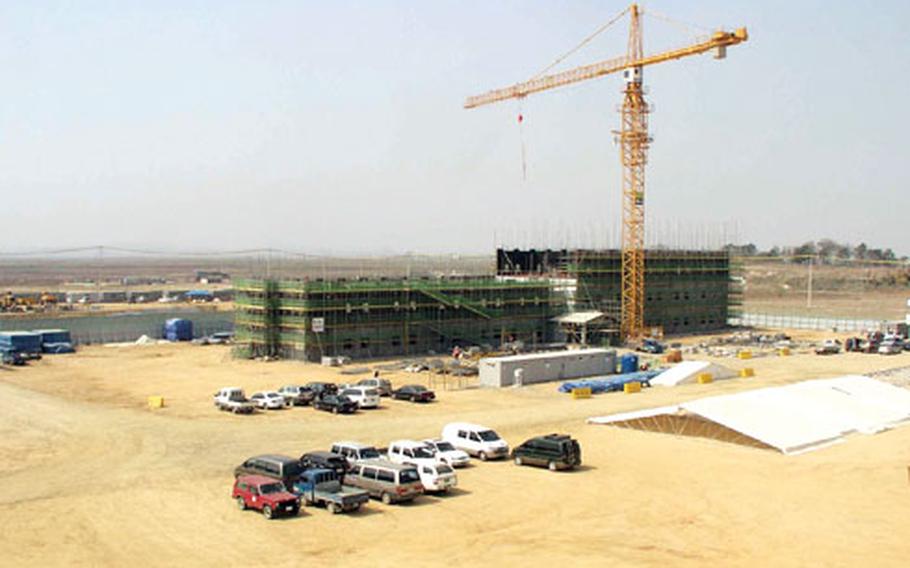
Six eight-story barracks rise at Camp Humphreys in April 2009 as part of the post's expansion to become the U.S. military’s main installation in South Korea. (Franklin Fisher/S&S)
CAMP FOSTER, Okinawa — A Senate Armed Services Committee panel has blasted U.S. military plans to move Marines off Okinawa and normalize tours in South Korea, warning that it is prepared to block any funding for Pacific realignments until the massive projects are better justified.
Sen. Claire McCaskill, D-Mo., delivered the stern message Tuesday in Washington as the Subcommittee on Readiness and Management Support unveiled its additions to the Senate’s proposed defense budget for the coming year.
The defense bill would deny any funding of the controversial Futenma air station relocation on Okinawa, a military buildup on Guam and tour changes that would allow servicemembers in South Korea to bring families until the Department of Defense considers alternatives and provides a master plan.
The announcement opened another crack in the U.S. resolve to follow through with plans that have been years in the making and have caused deep political difficulties with longtime ally Japan. It is also the most recent shot fired from the powerful Senate Armed Services Committee, which has become loudly critical of military plans that could eventually cost the U.S. and its allies tens of billions of dollars.
“This subcommittee will not authorize such multi-billion-dollar projects without showing the rigorous analysis behind why we are doing what we are doing and a well-thought-out master plan of how we are going to get it done at a set cost and on a set schedule,” McCaskill said during the hearing. “This is oversight at its most basic level.”
The comments closely follow criticisms made last month by Armed Services Committee Chairman Sen. Carl Levin, D-Mich., Sen. Jim Webb, D-Va., and Sen. John McCain, R-Ariz. After visiting the region, Levin and Webb announced that the military’s plans were “unrealistic, unworkable and unaffordable,” proposing that the military drop plans to relocate Futenma and modify plans to relocate 8,600 Marines from Okinawa to Guam.
Tuesday’s subcommittee announcement also comes on the heels of a Government Accountability Office report that found the military had not developed accurate cost estimates of its plans in the region — the total price tag could actually be close to $46 billion over the next decade — and had not appropriately considered alternatives.
McCaskill said the subcommittee will require several steps including “sound planning and justification” from military leaders and the Pentagon before giving the green light.
“With regard to Guam, our provision would address substantial increases in cost by requiring the commandant of the Marine Corps to certify his preferred force lay-down in the Pacific and then require the Secretary of Defense to provide the Congress with a master plan for implementation of the buildup before spending more money,” she said.
Also, the DOD director of cost assessment and program evaluation would be required to analyze alternatives to tour normalization and how they might meet military goals in South Korea, McCaskill said.
The Secretary of the Army would then have to issue a master plan explaining how military plans would be put into place.
“This should provide the Congress with greater clarity of the scope, schedule and cost of this large and complex undertaking,” McCaskill said.
On Wednesday, Defense Secretary Robert Gates deferred questions from the Senate Appropriations Committee on U.S. troop moves to Guam, saying that he and Secretary of State Hillary Clinton are scheduled to discuss those issues in a meeting with Japanese leaders next week. He declined to say whether cost concerns or the political backlash might jeopardize the 2014 completion date for those moves.
Stars and Stripes reporters Leo Shane III and Kevin Baron contributed to this report.